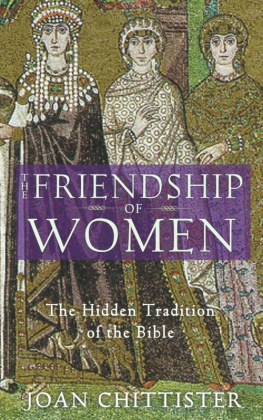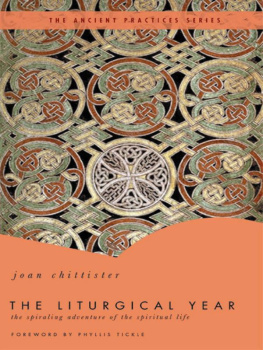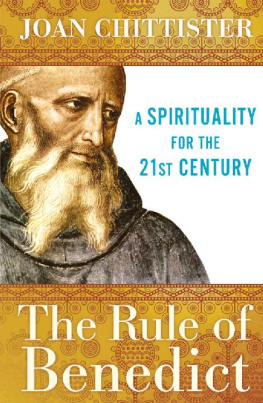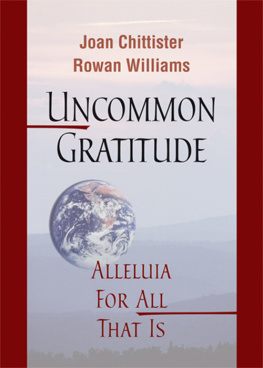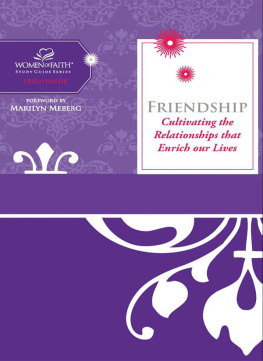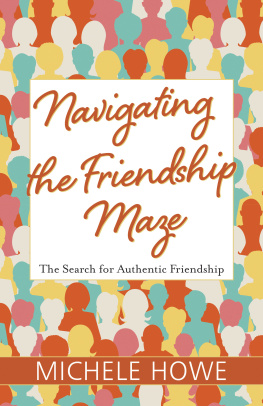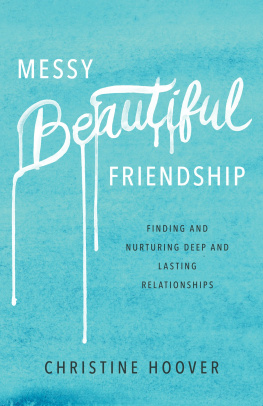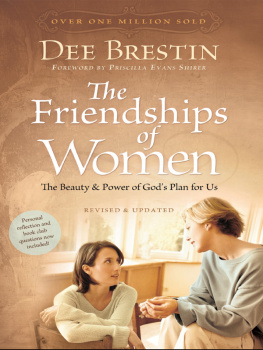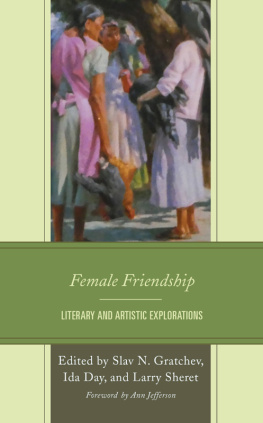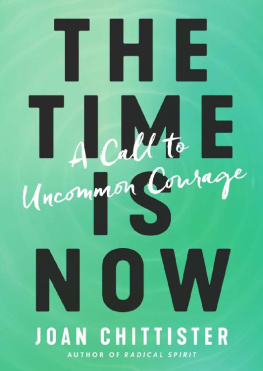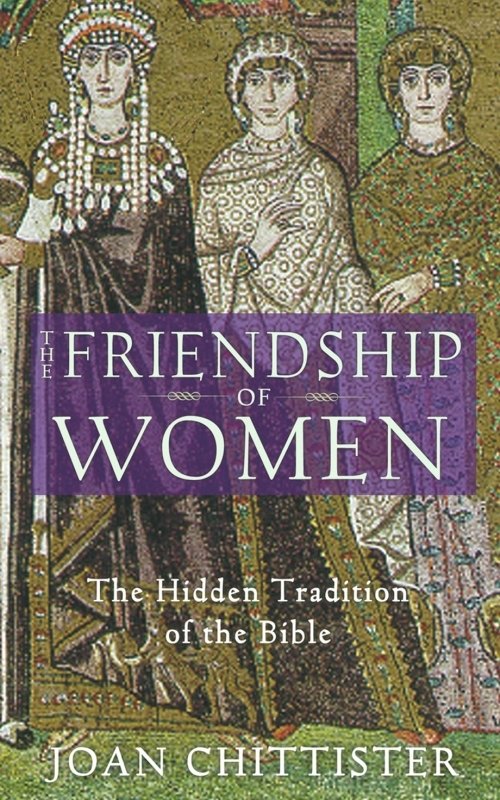EPILOGUE
I t is not easy to find models of womens friendships. By and large they were not recorded, lost like so much else of the history of women to the dust of time, underestimated in their own times, unnoticed throughout time, but never far from the surface, always the collagen of the womans world. What we do have, however, is the knowledge emerging in our own day to speak of their value, to describe their qualities. More than that,we have models of women who embodied the best in what women value in a friend. Lydia and her love for ideas, Prisca and her sense of self, Deborah and her sustaining wisdom, Phoebe and her untiring support, Esther and her courageous leadership, Martha and her respect for truth, Veronica and her empathy, Elizabeth and her acceptance, Ruth and her unrelenting availability, Anne and her nurturance, Miriam and her abiding joy, Mary Magdalene and her undying intimacy. Out of these small shards of barely profiled lives emerge the pictures of every womans love.
This small book is not meant to be anything more than the beginning of the cry to see the friendships between women as a strong power for good, a potential political force for the preservation of values that the world has greatly overlooked in favor of dominance and reason and individualism. But dominance has not saved us. And reason has been grossly unreasonable. Individualism made us cripplers of human community and has left us crippled ourselves, lost in a morass of solitary biases.
It is precisely in their penchant for bonding, fortending, for befriending, for embracing, for the gathering of peoples that womens gift for the creation of human community becomes most clear. Women supported women in biblical times; women support women today. They care for one anothers children, they cook one anothers meals, they edit reports for one another at the office, they dry one anothers tears, they applaud one anothers gifts, and they build up one anothers spirits through one dashed dream, one hoping generation to the next. Mothers urge daughters to be more than they were ever enabled to be. Sisters hold up sisters when everything else in life conspires to hold them down. Women carry women friends down the rutted roads of a womans life until the friend is strong enough to make the journey on her own. Women bind themselves to other women not as prisoners are bound but as mountain climbers are linked: on loose ropes designed to save but not control.
Life for a woman is far too commonly a long and lonely climb, often difficult, customarily overlooked. The contributions of women are seldom noted. The history of women and womens place in history isseldom told. The wisdom of women is, by and large, not anthologizedis, in other words, ignored. Despite the findings of modern psychology and sociology on the nature and quality of womens friendships, for instance, even many references in this book on womens friendship come from menbecause it was mens works that were printed, published, taught across time. Those days are over. Women, and the rest of the world as well, are listening for the voices of women now.
The bonding of women through contemporary groups, organizations, social circles, and public projects is now the breeding ground of a new kind of emotional life, personal development, re-creation, and even the transformation of public institutions. Womens groups expand the definition of women beyond the domestic arena to full public participation and voice.
Womens friendships and womens penchant for openness, possibility, presence, support, empathy, wisdom, truth, courage, nurturance, acceptance, joy, and intimacy are a new hope for humanity. If we can only recognize them, if we can only bring them to liferespected, revered, and invested with honorin theworld around us. For friendship is far more than a personal gift. The right friendship, rightly given, has the power to change the world. Albert Schweitzer said, Sometimes our light goes out, but it is blown again into flame by an encounter with another human being. Each of us owes the deepest thanks to those who have rekindled the light.
Whats even more important, perhapsit lasts. Or, as Emily Bront wrote, Love is like the wild rose-briar; Friendship like the holly-tree. The holly is dark when the rose-briar blooms, but which will bloom most constantly?
SCRIPTURE REFERENCES FOR THE WOMEN IN THIS BOOK
LYDIA Acts of the Apostles 16:1415
PRISCA Acts of the Apostles 18:26; Letter to the Romans 16:34
DEBORAH Judges 4:45:31
PHOEBE Letter to the Romans 16:12
ESTHER Book of Esther
MARTHA OF BETHANY Luke 10:3842; John 11:1744
VERONICA Luke 23:2729
ELIZABETH Luke 1:525, 3945, 4656, 5766
RUTH Book of Ruth
ANNE The Infancy Gospel of James/The Protovangelion
MIRIAM Exodus 14:1015:21
MARY MAGDALENE Matthew 28:110; Mark 16:111;
John 20:1118
LYDIA
Grwoth
N o soul is desolate, George Eliot wrote, as long as there is a human being for whom it can feel trust and reverence. The comment deserves serious consideration. It brings us to rethink the whole notion of friendship. If Eliot is correct, then a friendship is more than an element of social life. It is a spiritual force that touches the soul.
The fact is that companionship is not enough to fill a life. What is needed in human relationships above all, if they are to give substance to our lives, is the quality of fusion, the character of meld. It is the challenge of connection. It is an insight of grave consequence in a world where we can live in crowds forever and never even notice that we are alone. It is so easy to think that we have friends and know how to be a friend when all we really have are contacts. It is so easy to think we have a relationship with someone when all we really have is more or less time for idle conversations with people we see often but keep at a distance always.
Where there is no reverence, no trust, there may be attraction, but there is no friendship. It is a social question of great import in the highly anonymous society in which we live, where neighbors do not know neighbors and telephones have answering machines to weed out calls.
The underlying tension in contemporary Western society is the struggle between the public and the personal. We are a private people who happen to live in groups. We are individuals who develop communitiesbased more on the rights of each separate member than on our obligations to the groups themselves. We prize autonomy as we honor little else, and yet nothing has become more apparent in the advance toward personal independence than the inextricable connection between human relationship and mental health. Women who have friendswho trust and reverence someoneare simply healthier, happier people. Theyre more responsive to others, more secure about themselves. Friends open new worlds for us and invite us in, laughing and singing. Friends carry our burdens in their own hearts and give us the wisdom of distance to deal with them. Friends, the people we really trust, point a way.
The question is how to balance independence and relationship. What is required for us to come out of ourselves without at the same time losing ourselves in the interests and ideas, the plans and pursuits of the other? Its a difficult question in a society of gurus who offer new feel-good fixes by the day. But whatever the latest fashion in self-development, there is always, for the woman who looks for root in the tried-and-true, the memory of Lydia. To understand friendship and itsplace in the life of a woman, we need to maintain the memory of Lydia.

